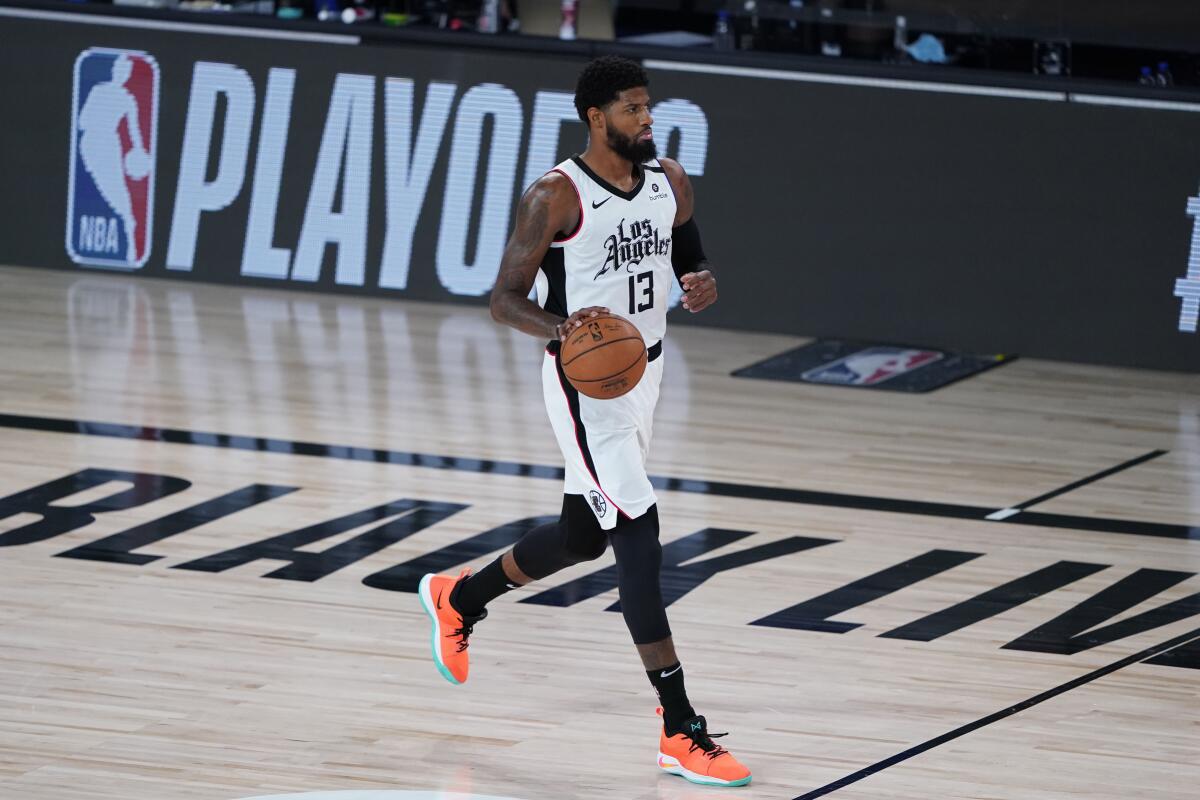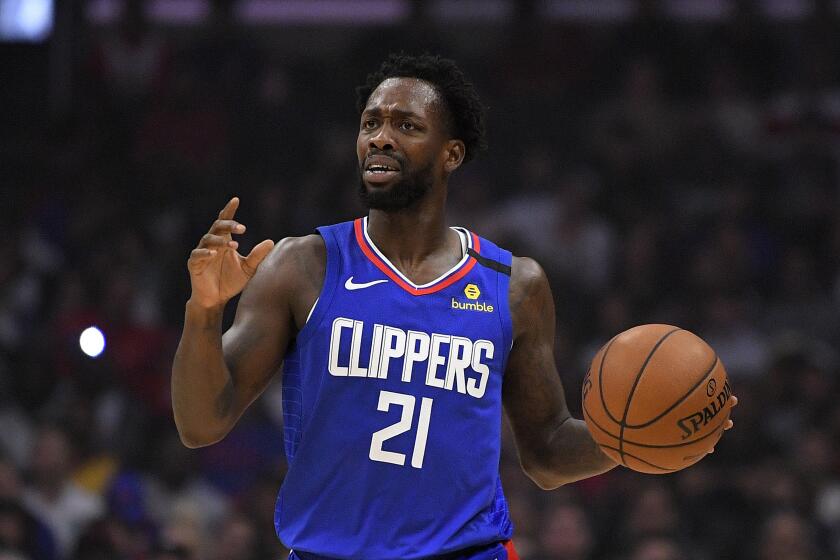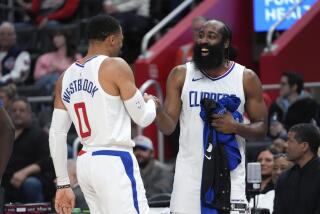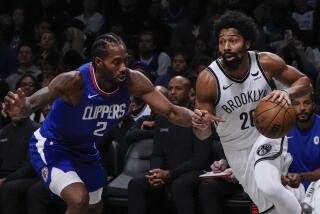When Paul George talked of his struggles, peers could relate

As talk of stoppages and plans for tangible social justice action dominated discussions inside the NBA’s Disney World campus in recent days, a few peers of Clippers forward Paul George pulled him aside for a different conversation.
George’s comments following the Clippers’ Game 5 victory against Dallas on Tuesday spread wider than a typical postgame interview. George detailed how, during a three-game shooting slump that led him to be ridiculed on social media, he’d talked with a team psychiatrist about feeling anxious, depressed and isolated. He’d taken his mental health for granted, he said.
Other players heard that.
“Trust me, I know exactly what PG is going through,” Lakers guard Danny Green told reporters Friday. “You have nothing but to look at your phone and social media all day and all they’re doing is bullying you.”
Within 15 hours, the story was pushed out of the news cycle after Milwaukee refused to take the court for a playoff game against Orlando as a protest following the shooting of Jacob Blake in Kenosha, Wis., a stoppage that led to an emotional players’ meeting Wednesday night and more meetings between players, the league and owners the following day.
But George suggested on Saturday he wasn’t surprised to hear from other players about his comments on mental health. Because even as players’ messages have traveled far beyond their Orlando, Fla., campus, some will remain inside the resort’s perimeter for potentially six more weeks.
“Whether I was the first to say it or not, we’re all dealing with it,” George said Saturday, the day before the Clippers’ series with Dallas resumes with Game 6 on Sunday. “I’ve had conversations with guys here, and there’s been a couple guys that is like, ‘Man, I’m happy I’m not the only one. I’ve been dealing with this, too.’ It’s a thing in here. It’s a brotherhood. Danny has got my back, I got his.”
On Wednesday night, Clippers players didn’t want to resume the NBA playoffs because of racial strife in the country. By Thursday morning, they were ready to play.
That players have felt emboldened to publicly discuss the topic is still a relatively recent development. In a 2018 essay, Cavaliers forward Kevin Love said he’d experienced a panic attack during a game that season. Then-Toronto guard DeMar DeRozan revealed on Twitter he suffered from depression. The NBA launched its Mind Health program the same year and mental health professionals are available on-site within the NBA campus.
“If you can have the courage to come out and speak about what’s going on in your head and mentally, psychologically, I don’t care who you are, if you’re Paul George or you’re a regular person on the street, like, that’s empowering,” Clippers guard Landry Shamet said.
Still, George’s comments led former NBA star and Turner Sports analyst Charles Barkley to respond during a radio appearance that players “are the luckiest people in the world to dribble a stupid basketball and make millions of dollars — we’re never in a dark place.”
“Keep that … to yourself,” former NBA guard Raja Bell said during a Ringer podcast.
“It’s been such a taboo subject in society and probably even more taboo in sports because of the machismo,” coach Doc Rivers said. “We’re so tough and we’ve got to reflect this toughness about us, this macho about us. Anything with the mind is weak, you know — that’s been the messaging throughout society.
“… I just think we’ve just got to keep talking about it. The more we talk about it, the more we make it normal. There’s people out there in our league that will open up that we didn’t know had issues, and then we can give them help.”
On Wednesday night, Clippers players didn’t want to resume the NBA playoffs because of racial strife in the country. By Thursday morning, they were ready to play.
George sought help from his teammates among other outlets.
“I wasn’t just going to cave in immediately,” he said. “If it got severe, I think my team would have understood if I needed to walk away from this. But all it took was me seeking help and seeking advice, and starting from there, it helped. It put me in a different place. I mean, that’s where the decision was made that I could continue to keep going, because of the help that I got.”
Time to vote
After the NBA and players committed Thursday to focusing on initiatives that include increased voting and criminal justice reform, George said players “can’t just talk the talk, we’ve got to walk the walk” with following through.
For Rivers, who opened the season by discussing the importance of voting with players, one tangible step is ensuring a majority of players register to vote while in the bubble.
“I think it’s 20% of the players voted in the last election or something like that,” Rivers said. “... we’re going to get them registered here in the bubble. We’re going to try to get every team registered, every player registered to vote.
“It’s so difficult for players because most of the time it’s in the middle of the season and players are from so many different states that it’s a lot of absentee voting, and we’re going to get them all done. We want to get up in the 80s, 90s, 100 if possible, percentile as far as players and coaches voting.”
Etc.
Clippers guard Patrick Beverley, whose strained left calf has sidelined him since Game 1, has been upgraded from doubtful to questionable to play Sunday. ... Four Mavericks are listed as questionable: Forward Dorian Finney-Smith and guards Tim Hardaway Jr., Luka Doncic and Trey Burke.
More to Read
Get our high school sports newsletter
Prep Rally is devoted to the SoCal high school sports experience, bringing you scores, stories and a behind-the-scenes look at what makes prep sports so popular.
You may occasionally receive promotional content from the Los Angeles Times.









